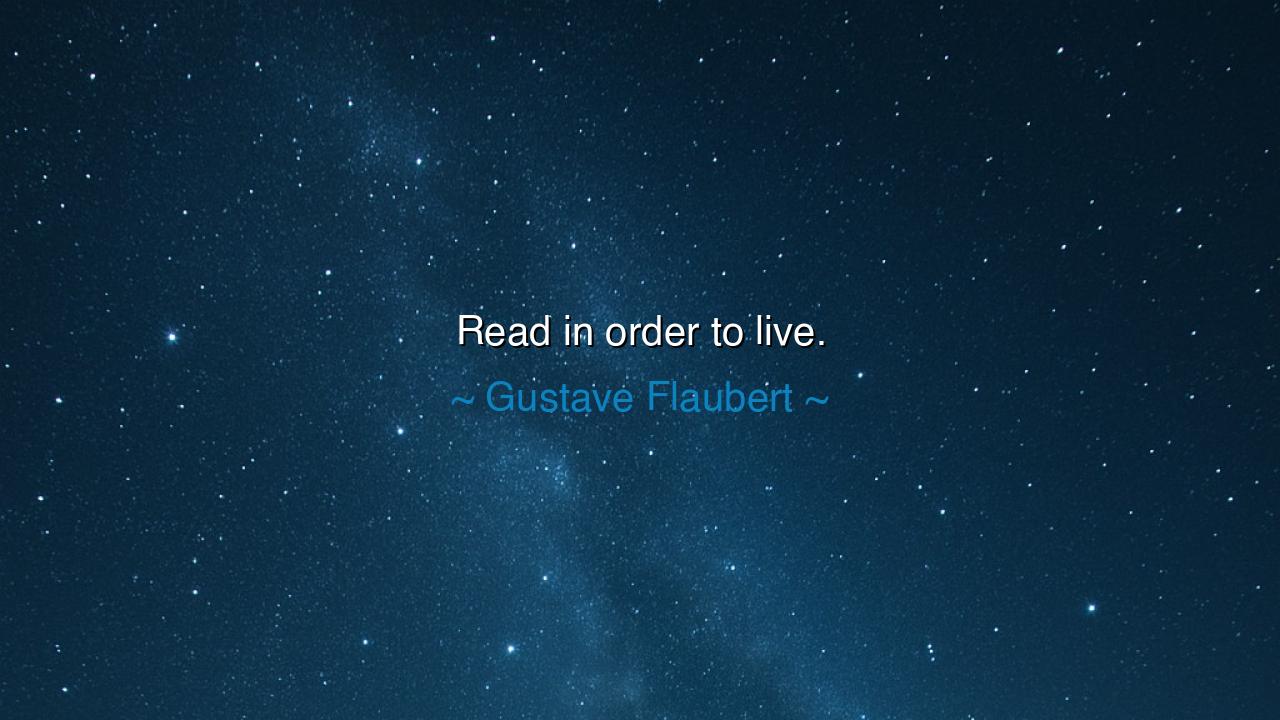
Read in order to live.






When Gustave Flaubert, the great French novelist, declared, “Read in order to live,” he spoke not merely as a writer, but as a prophet of the inner life. In those four words, he captured the sacred bond between reading and existence, between the nourishment of the mind and the endurance of the soul. For to Flaubert, books were not ornaments of leisure; they were vessels of vitality. Through reading, one does not escape life — one enters it more deeply. Without the wisdom of words, the imagination withers, and without imagination, the soul forgets how to breathe.
In Flaubert’s age, the nineteenth century — an era of revolutions, machinery, and spiritual uncertainty — the world was changing faster than the heart could follow. Humanity, dazzled by progress, risked losing touch with meaning. Flaubert, who gave the world Madame Bovary, saw this danger clearly: he watched people chase sensation and comfort while neglecting thought and reflection. His command to “read in order to live” was therefore not a gentle suggestion, but a plea — that men and women must turn to the written word to recover the depth of being that the modern world was stealing from them.
To read, in Flaubert’s understanding, is not to consume information; it is to drink from the wells of other souls. Each page opens a window into the vastness of human experience — joy, despair, courage, love, and loss. Through the words of others, one learns to see with wider eyes, to feel with a fuller heart. A book is both mirror and map: it reflects who we are and reveals where we might yet go. Flaubert himself lived through his characters — not as a withdrawal from life, but as a way of exploring its every hidden corner. “Read in order to live” was the creed of a man who believed that literature gives meaning to the spaces where life alone is not enough.
Consider Anne Frank, the young girl who hid in an attic while the world outside descended into darkness. Her only escape, her only window into light, was her diary — her writing and her reading. In the pages of books, she found not mere distraction, but strength; not fantasy, but truth. Her soul endured through words. Even as war destroyed her body, her voice lived on. Flaubert’s dictum lives in her story: through reading and writing, humanity survives its own tragedies. Those who read deeply, even in despair, continue to live fully — for reading allows the spirit to transcend circumstance.
The ancients knew this power well. The philosophers of Greece and Rome — Plato, Seneca, Marcus Aurelius — all believed that reading was not entertainment, but a form of moral and spiritual training. They read “in order to live” better, to think clearly, to act with justice, and to face death without fear. To them, books were companions in solitude and teachers in adversity. They understood that one who does not read walks through life half-awake, while the reader walks among stars.
And yet, even now, the world forgets this wisdom. Many live surrounded by words yet untouched by their spirit. They scroll through fragments, but rarely dwell within thought. They mistake abundance of information for abundance of understanding. Flaubert’s warning rings louder than ever: to “read in order to live” is to reclaim what technology and haste threaten to steal — the art of reflection, the intimacy of thought, the quiet conversation between soul and sentence.
So let this be the counsel for all who seek a richer existence: Read, not because it is useful, but because it is vital. Read what challenges you, what unsettles and awakens you. Read the dead, so that they may teach you how to live among the living. Read not for profit, but for purpose. For every great book you open becomes a bridge to another world — and in crossing it, you return more alive to your own.
Thus, Flaubert’s command is not a whisper from the past, but a timeless summons to the human spirit: “Read in order to live.” For in the turning of pages lies the turning of the soul. Through reading, we learn to endure, to imagine, to love, and to see. And when the body tires and the world grows dim, the mind that has read continues to shine — bright, unbroken, and eternal.






AAdministratorAdministrator
Welcome, honored guests. Please leave a comment, we will respond soon